 Technology peripherals
Technology peripherals
 AI
AI
 'The owner of Bilibili UP successfully created the world's first redstone-based neural network, which caused a sensation on social media and was praised by Yann LeCun.'
'The owner of Bilibili UP successfully created the world's first redstone-based neural network, which caused a sensation on social media and was praised by Yann LeCun.'
'The owner of Bilibili UP successfully created the world's first redstone-based neural network, which caused a sensation on social media and was praised by Yann LeCun.'
In Minecraft, redstone is a very important item. It is a unique material in the game. Switches, redstone torches, and redstone blocks can provide electricity-like energy to wires or objects.

Redstone circuits can be used to build structures for you to control or activate other machinery. They themselves can be designed to respond to manual activation by the player, or can be repeated repeatedly. Output signals or respond to non-player-induced changes, such as creature movement, item drops, plant growth, day and night changes, etc.
Therefore, in my world, redstone can control an extremely large number of types of machinery, ranging from simple machinery such as automatic doors, light switches and strobe power supplies, to huge elevators, automatic farms, Mini gaming platforms and even computers built into the game.
Recently, Bilibili UP owner @chenzhanaotou and others realized real "red stone artificial intelligence" in Minecraft. They spent six months building the world's first pure red stone Neural network, tasked with recognizing 15×15 handwritten digits.
The authors stated that they used a non-traditional calculation method - random calculation to implement the neural network. The design and layout are much simpler than traditional full-precision calculation, and the single theoretical recognition time is only 5 minutes.


This pure red stone neural network has completed a common image recognition task in the field of machine learning - handwritten digit recognition, and the accuracy has reached 80% (in MNIST simulated on the data set).

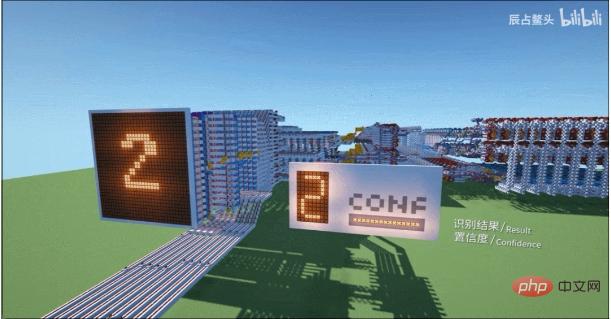
In the implementation process, the various elements used by the author include the following:
A single neuron receives Multiple inputs and produce one output.
Add "Multiplier" to perform decimal multiplication using only random numbers and a single logic gate.
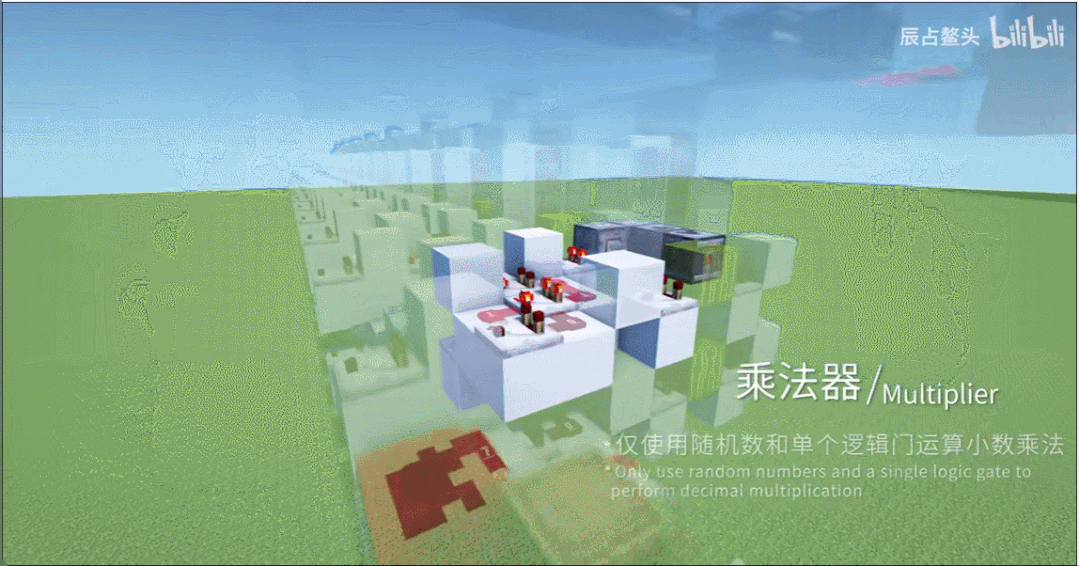
The neuron array outputs the recognition result or passes it to the next layer.
Confidence of each number.

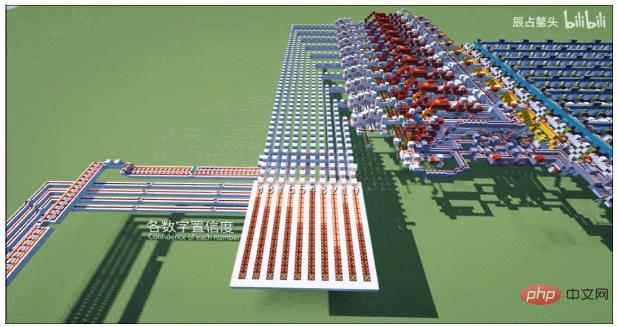
The convolutional layer is used to extract stroke features.
The first layer of full connection: compress information and classify it.
Activation function array: Nonlinearly map data to high-dimensional feature space.
Fully connected second and third layers: further classify and output recognition results.
The author stated that the architecture used by the network is compressed LeNet-5, with an accuracy of 80%.
However, due to the computing power of Minecraft, the actual recognition time exceeds 20 minutes. Nonetheless, this is still a major breakthrough in the field of redstone digital electronics and may also inspire real-life hardware neural networks.
Currently, the video has been played more than 800,000 times, ranking highest at No. 39 on the Bilibili rankings, astonishing netizens from all walks of life. Even Turing Award winner Yann LeCun reposted the video on Facebook, saying, "A very patient and persistent person implemented LeNet-5 in my world using redstone." LeCun is the proposer of the LeNet architecture .
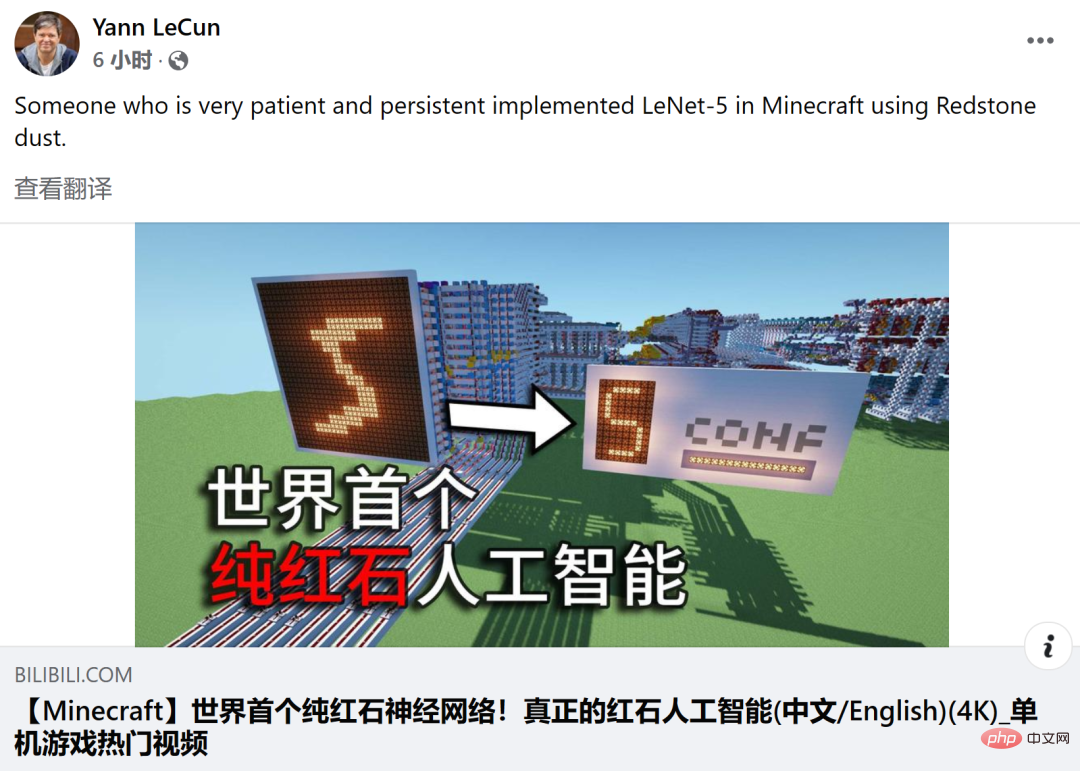
【Minecraft】The world’s first pure redstone neural network! Real Redstone Artificial Intelligence (Chinese/English) [Minecraft] Redstone Convolutional Neural Network - Principle
The principle behind
is in another video "[Minecraft] Redstone Convolution In "Neural Network - Principle", the author explains in detail the principle of redstone convolutional neural network.
In general, they use a compressed LeNet-5 convolutional neural network. Convolution is the first step of the network calculation. It uses a weighted window (convolution kernel) to scan the image one by one and extract stroke features. .
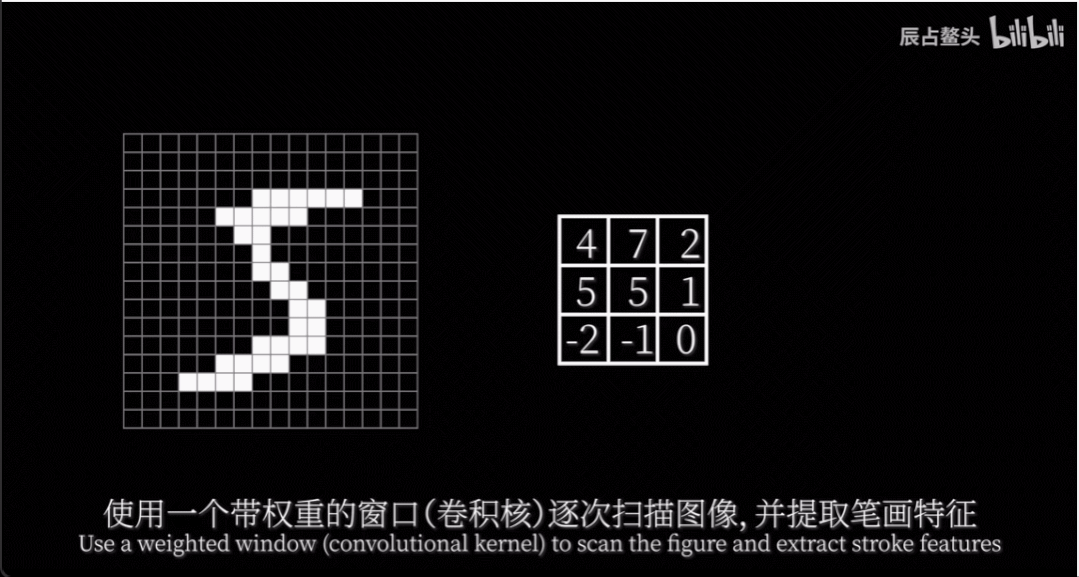
Then these stroke features are fed into the deep neural network (fully connected layer) for classification and recognition.
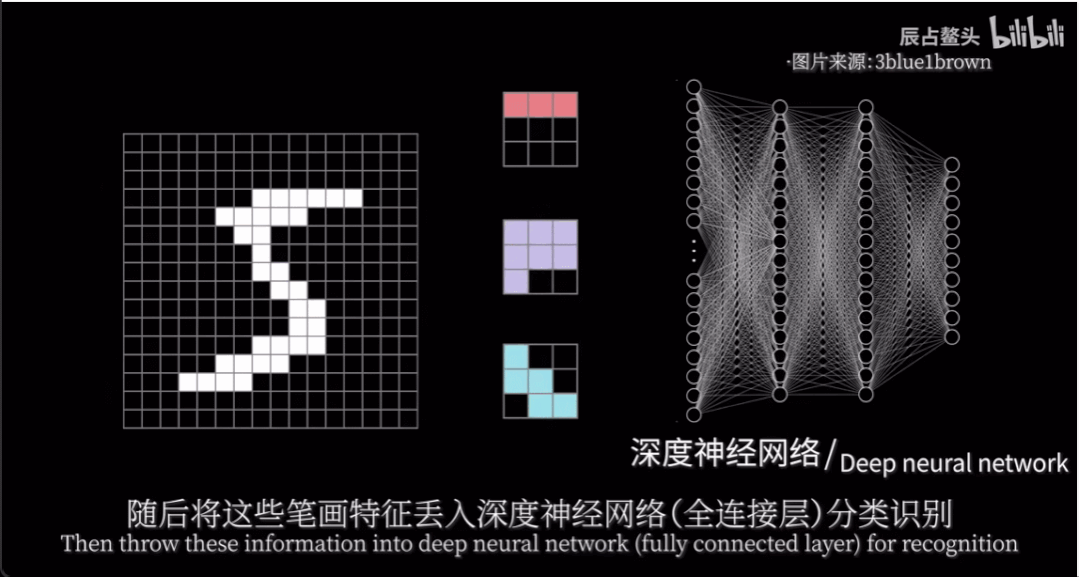
Implementing Redstone Neural Network in Minecraft
The author first lists the input devices, including a single pulse Pressure plate writing tablet and 15×15 coordinate screen. The handwriting pad generates a coordinate signal of 2 ticks each time, which is then drawn on the screen.

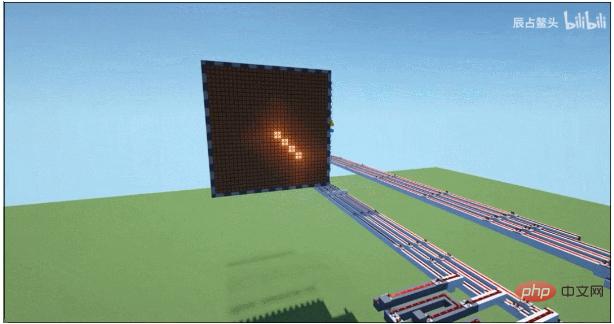
The input handwritten digits then enter the convolution layer. The calculation method is to accumulate the covered parts of the convolution kernel and output the result to the next layer. Moreover, in order to ensure nonlinearity, the output also passes through the ReLU function.

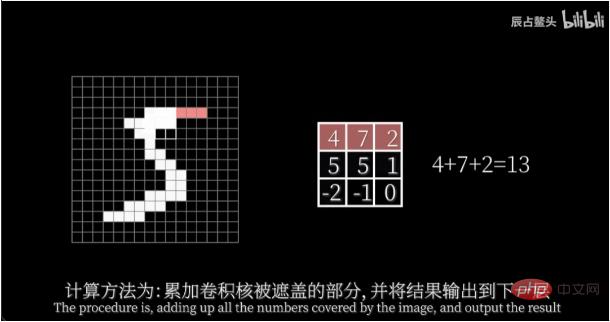
Since the convolution kernel is only 3×3, the author directly uses the electrical model operation and automatically performs ReLU at the output end.

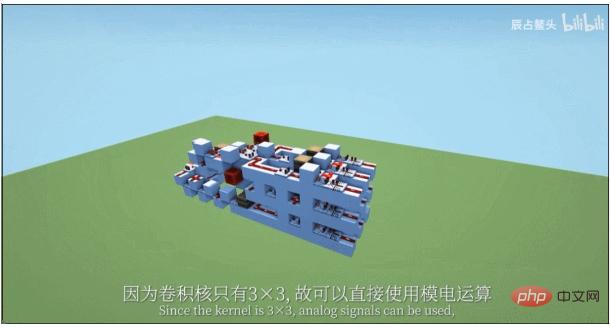
In addition, because the convolution cannot move like in the animation, a direct stacking method is used, and then connected to the handwriting pad input through hard wiring. .

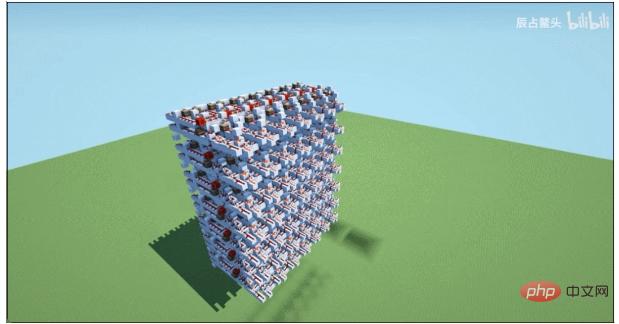
At the fully connected layer, each layer is composed of several neural networks. Each neuron connects multiple inputs and produces an output. The neuron weights and accumulates each input and then feeds it into an activation function output. It should be noted that the weighted summation is a "linear division", and the activation function must be non-linear to increase the dimension. The author used tanh (hyperbolic tangent) as the activation function.
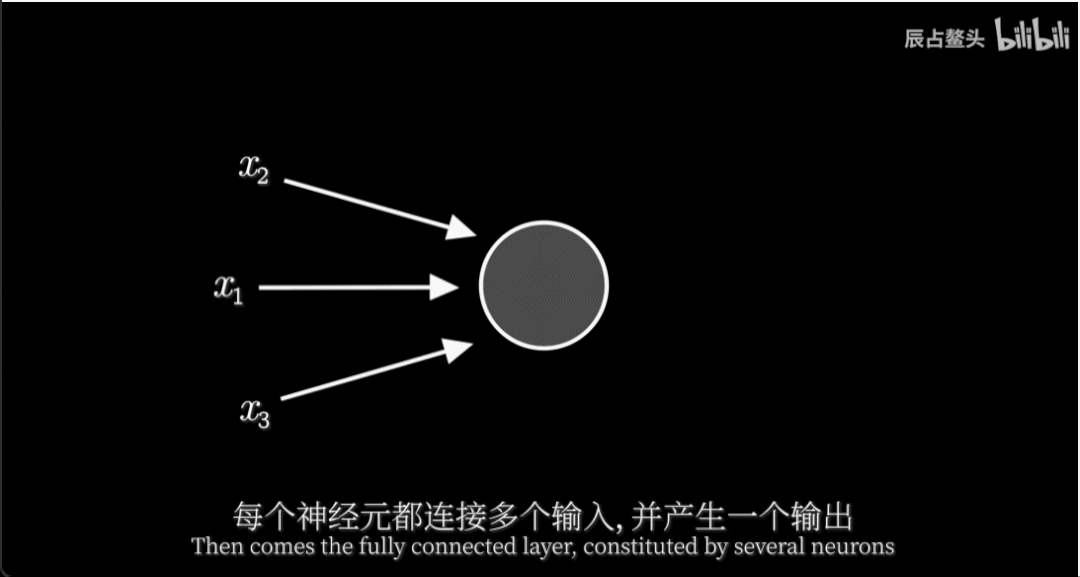
is reflected in the actual neuron circuit, as shown in the figure below.

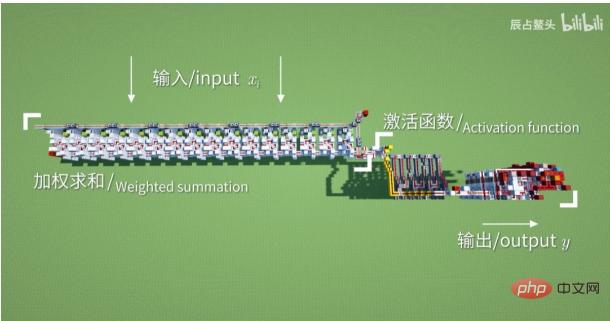
At the same time, the weight is stored in the thrower (used to adjust the ratio of items to generate random strings of different frequencies). The input is multiplied by the weight and passed through the module. Add up.
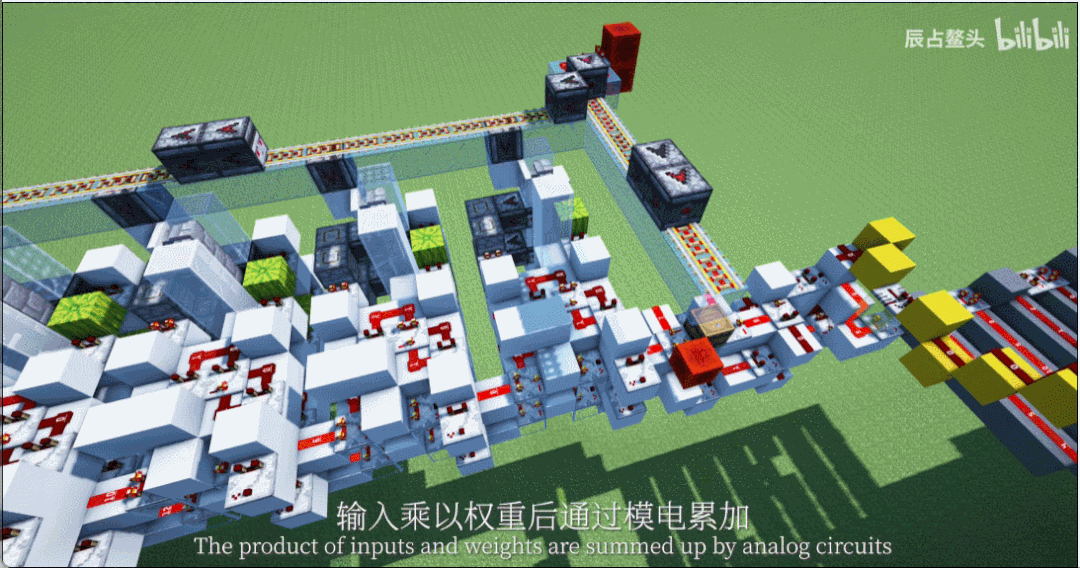
Final circuit implementation
Regarding the circuit implementation, first calculate the addition through analog electrical calculations, and then convert it into digital electrical signals.

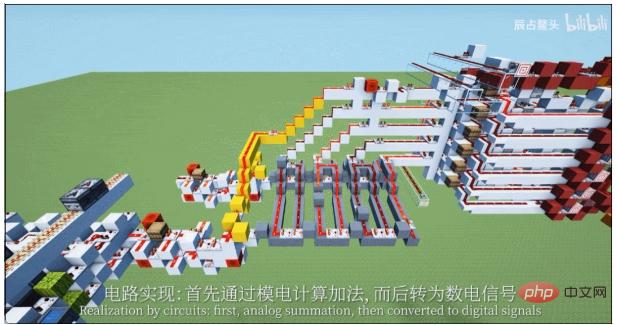
The accumulator is modified from the 2tick pipeline adder provided by another Up master so that it will not overflow.

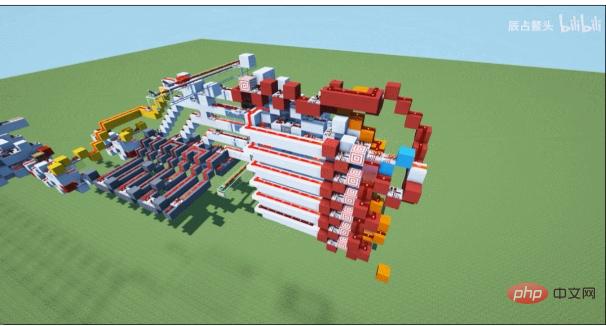
The neurons are then stacked to form a fully connected layer.

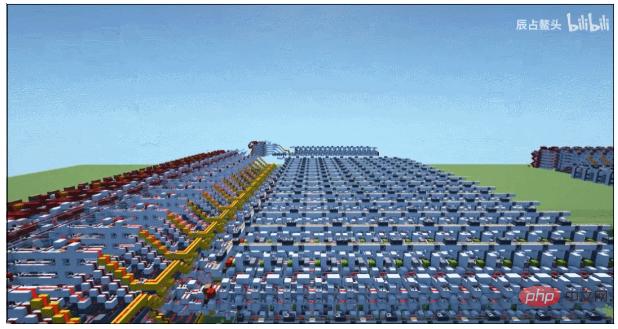
The output of the last layer and the inter-layer buffer use the following analog counter, which can count the number of "1"s in the 5Hz string , the capacity is 1024.

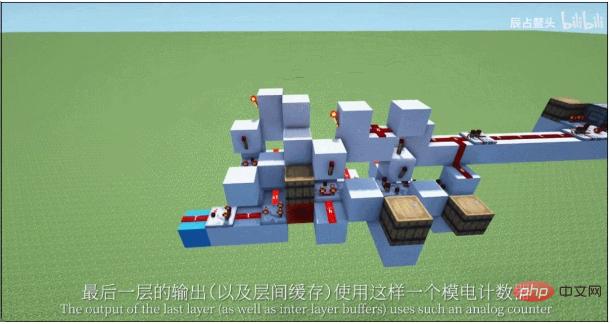
Finally at the output layer, the upper 4 bits of the counter are connected to the counting board, and then the circuit selects the maximum value and displays it on the output panel.

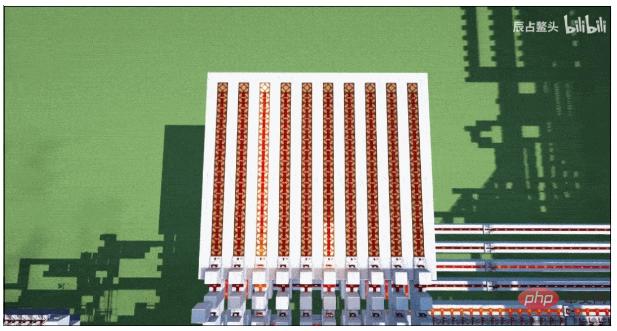
At the end of the video, the author shows the final network structure, as shown in the figure below. Among them, the weight range is [-1, 1], the random string length is 1024, and the accuracy on the MNIST data set is about 80%. However, when the string length is 256, the accuracy is only 62%.
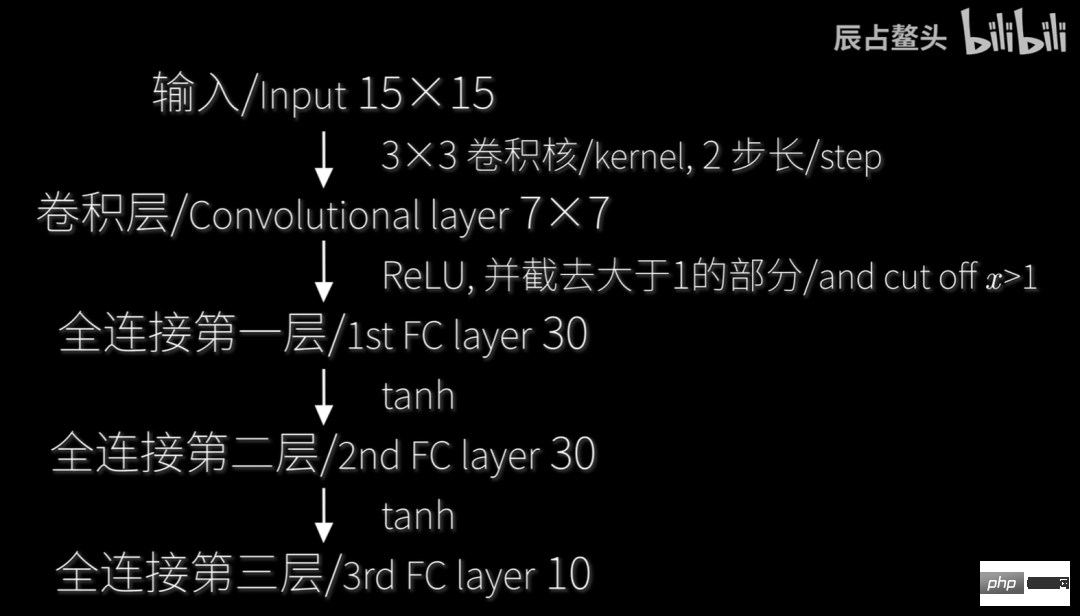
The above is the detailed content of 'The owner of Bilibili UP successfully created the world's first redstone-based neural network, which caused a sensation on social media and was praised by Yann LeCun.'. For more information, please follow other related articles on the PHP Chinese website!

Hot AI Tools

Undresser.AI Undress
AI-powered app for creating realistic nude photos

AI Clothes Remover
Online AI tool for removing clothes from photos.

Undress AI Tool
Undress images for free

Clothoff.io
AI clothes remover

AI Hentai Generator
Generate AI Hentai for free.

Hot Article

Hot Tools

Notepad++7.3.1
Easy-to-use and free code editor

SublimeText3 Chinese version
Chinese version, very easy to use

Zend Studio 13.0.1
Powerful PHP integrated development environment

Dreamweaver CS6
Visual web development tools

SublimeText3 Mac version
God-level code editing software (SublimeText3)

Hot Topics
 Bytedance Cutting launches SVIP super membership: 499 yuan for continuous annual subscription, providing a variety of AI functions
Jun 28, 2024 am 03:51 AM
Bytedance Cutting launches SVIP super membership: 499 yuan for continuous annual subscription, providing a variety of AI functions
Jun 28, 2024 am 03:51 AM
This site reported on June 27 that Jianying is a video editing software developed by FaceMeng Technology, a subsidiary of ByteDance. It relies on the Douyin platform and basically produces short video content for users of the platform. It is compatible with iOS, Android, and Windows. , MacOS and other operating systems. Jianying officially announced the upgrade of its membership system and launched a new SVIP, which includes a variety of AI black technologies, such as intelligent translation, intelligent highlighting, intelligent packaging, digital human synthesis, etc. In terms of price, the monthly fee for clipping SVIP is 79 yuan, the annual fee is 599 yuan (note on this site: equivalent to 49.9 yuan per month), the continuous monthly subscription is 59 yuan per month, and the continuous annual subscription is 499 yuan per year (equivalent to 41.6 yuan per month) . In addition, the cut official also stated that in order to improve the user experience, those who have subscribed to the original VIP
 Context-augmented AI coding assistant using Rag and Sem-Rag
Jun 10, 2024 am 11:08 AM
Context-augmented AI coding assistant using Rag and Sem-Rag
Jun 10, 2024 am 11:08 AM
Improve developer productivity, efficiency, and accuracy by incorporating retrieval-enhanced generation and semantic memory into AI coding assistants. Translated from EnhancingAICodingAssistantswithContextUsingRAGandSEM-RAG, author JanakiramMSV. While basic AI programming assistants are naturally helpful, they often fail to provide the most relevant and correct code suggestions because they rely on a general understanding of the software language and the most common patterns of writing software. The code generated by these coding assistants is suitable for solving the problems they are responsible for solving, but often does not conform to the coding standards, conventions and styles of the individual teams. This often results in suggestions that need to be modified or refined in order for the code to be accepted into the application
 Seven Cool GenAI & LLM Technical Interview Questions
Jun 07, 2024 am 10:06 AM
Seven Cool GenAI & LLM Technical Interview Questions
Jun 07, 2024 am 10:06 AM
To learn more about AIGC, please visit: 51CTOAI.x Community https://www.51cto.com/aigc/Translator|Jingyan Reviewer|Chonglou is different from the traditional question bank that can be seen everywhere on the Internet. These questions It requires thinking outside the box. Large Language Models (LLMs) are increasingly important in the fields of data science, generative artificial intelligence (GenAI), and artificial intelligence. These complex algorithms enhance human skills and drive efficiency and innovation in many industries, becoming the key for companies to remain competitive. LLM has a wide range of applications. It can be used in fields such as natural language processing, text generation, speech recognition and recommendation systems. By learning from large amounts of data, LLM is able to generate text
 Can fine-tuning really allow LLM to learn new things: introducing new knowledge may make the model produce more hallucinations
Jun 11, 2024 pm 03:57 PM
Can fine-tuning really allow LLM to learn new things: introducing new knowledge may make the model produce more hallucinations
Jun 11, 2024 pm 03:57 PM
Large Language Models (LLMs) are trained on huge text databases, where they acquire large amounts of real-world knowledge. This knowledge is embedded into their parameters and can then be used when needed. The knowledge of these models is "reified" at the end of training. At the end of pre-training, the model actually stops learning. Align or fine-tune the model to learn how to leverage this knowledge and respond more naturally to user questions. But sometimes model knowledge is not enough, and although the model can access external content through RAG, it is considered beneficial to adapt the model to new domains through fine-tuning. This fine-tuning is performed using input from human annotators or other LLM creations, where the model encounters additional real-world knowledge and integrates it
 To provide a new scientific and complex question answering benchmark and evaluation system for large models, UNSW, Argonne, University of Chicago and other institutions jointly launched the SciQAG framework
Jul 25, 2024 am 06:42 AM
To provide a new scientific and complex question answering benchmark and evaluation system for large models, UNSW, Argonne, University of Chicago and other institutions jointly launched the SciQAG framework
Jul 25, 2024 am 06:42 AM
Editor |ScienceAI Question Answering (QA) data set plays a vital role in promoting natural language processing (NLP) research. High-quality QA data sets can not only be used to fine-tune models, but also effectively evaluate the capabilities of large language models (LLM), especially the ability to understand and reason about scientific knowledge. Although there are currently many scientific QA data sets covering medicine, chemistry, biology and other fields, these data sets still have some shortcomings. First, the data form is relatively simple, most of which are multiple-choice questions. They are easy to evaluate, but limit the model's answer selection range and cannot fully test the model's ability to answer scientific questions. In contrast, open-ended Q&A
 SOTA performance, Xiamen multi-modal protein-ligand affinity prediction AI method, combines molecular surface information for the first time
Jul 17, 2024 pm 06:37 PM
SOTA performance, Xiamen multi-modal protein-ligand affinity prediction AI method, combines molecular surface information for the first time
Jul 17, 2024 pm 06:37 PM
Editor | KX In the field of drug research and development, accurately and effectively predicting the binding affinity of proteins and ligands is crucial for drug screening and optimization. However, current studies do not take into account the important role of molecular surface information in protein-ligand interactions. Based on this, researchers from Xiamen University proposed a novel multi-modal feature extraction (MFE) framework, which for the first time combines information on protein surface, 3D structure and sequence, and uses a cross-attention mechanism to compare different modalities. feature alignment. Experimental results demonstrate that this method achieves state-of-the-art performance in predicting protein-ligand binding affinities. Furthermore, ablation studies demonstrate the effectiveness and necessity of protein surface information and multimodal feature alignment within this framework. Related research begins with "S
 Five schools of machine learning you don't know about
Jun 05, 2024 pm 08:51 PM
Five schools of machine learning you don't know about
Jun 05, 2024 pm 08:51 PM
Machine learning is an important branch of artificial intelligence that gives computers the ability to learn from data and improve their capabilities without being explicitly programmed. Machine learning has a wide range of applications in various fields, from image recognition and natural language processing to recommendation systems and fraud detection, and it is changing the way we live. There are many different methods and theories in the field of machine learning, among which the five most influential methods are called the "Five Schools of Machine Learning". The five major schools are the symbolic school, the connectionist school, the evolutionary school, the Bayesian school and the analogy school. 1. Symbolism, also known as symbolism, emphasizes the use of symbols for logical reasoning and expression of knowledge. This school of thought believes that learning is a process of reverse deduction, through existing
 SK Hynix will display new AI-related products on August 6: 12-layer HBM3E, 321-high NAND, etc.
Aug 01, 2024 pm 09:40 PM
SK Hynix will display new AI-related products on August 6: 12-layer HBM3E, 321-high NAND, etc.
Aug 01, 2024 pm 09:40 PM
According to news from this site on August 1, SK Hynix released a blog post today (August 1), announcing that it will attend the Global Semiconductor Memory Summit FMS2024 to be held in Santa Clara, California, USA from August 6 to 8, showcasing many new technologies. generation product. Introduction to the Future Memory and Storage Summit (FutureMemoryandStorage), formerly the Flash Memory Summit (FlashMemorySummit) mainly for NAND suppliers, in the context of increasing attention to artificial intelligence technology, this year was renamed the Future Memory and Storage Summit (FutureMemoryandStorage) to invite DRAM and storage vendors and many more players. New product SK hynix launched last year





